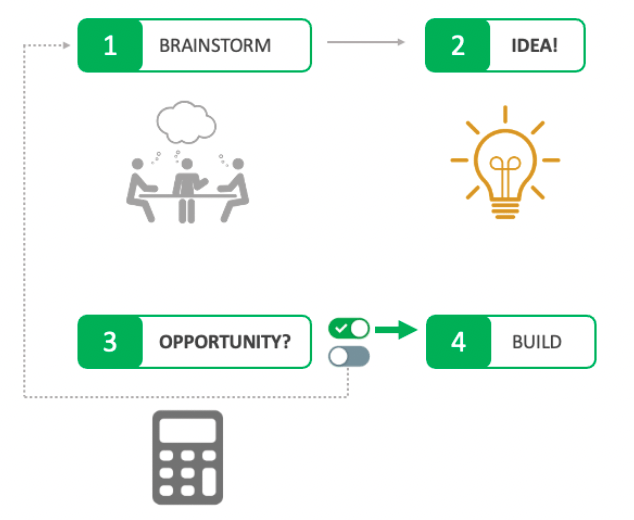What Are the Definitions of Ideas vs. Opportunities?
In product management and business, ideas differ from opportunities. Here’s the easiest way to understand the distinction between ideas vs. opportunities. Furthermore, an idea is a concept that has not researched to determine its chances of market success. The idea becomes an opportunity only after its creators have subjected it to research. When they have data they can make the case that the product can be profitable.
Your team should subject any product idea to the opportunity research process before committing time and resources.

An Example of an Idea vs. an Opportunity
The nonfiction book industry provides a useful illustration of the difference between an idea and an opportunity.
A business book idea.
Imagine you’re an author, and you come up with an idea for a business book for people starting a career in product management. Your book will help new product managers navigate their first 90 days on the job.
Question: Will this book succeed on the market?
You can’t answer yet because you haven’t subjected the idea to research. Publishers will demand you complete this phase—by developing a book proposal—before they consider working with you.
Is the business book an opportunity?
Developing a book proposal parallels the market research phase of vetting a new product idea. The proposal helps you determine if your book idea is an opportunity. It forces you to determine:
The size of your potential audience:
How many product professionals are out there today, and how many more enter the field each year? A higher number suggests more potential sales for your book.
(Note: You can add to the credibility of your evidence by also researching the number of books the average product manager buys each year. If that number is high, it will help you make a stronger case for the success of your book.)
Your authority on the topic:
What experience or education gives you the expertise to write about this subject?
The competitive landscape:
Are there similar books already on the market? Are those books successful? How will yours differ from them?
Your platform as an author:
Do you have a built-in audience (through social media platforms, magazine columns) who will likely buy your book?
With each of these data points, the author presents publishers with evidence suggesting that the book has potential for commercial success.
The process is very similar for translating product ideas into opportunities. But in the case of researching products to figure out whether they can become market successes, you will need to include additional data points. We’ll review those below.
How Can You Turn an Idea into an Opportunity?
When your team comes up with an idea for a new product or feature, you will want to subject that concept to questions like the following.
- Does it solve a market need (and can we prove this with research from our personas)?
- Have we proven (again, with feedback from our user and buyer personas) that there is enough of a market willing to pay for this product?
- Will we be able to sell it for a price that will make it profitable given the resources we’ll need to build and support it?
- Can we capture a sufficient amount of the market for this new product, even if competitors also develop similar products?
- Will we have executive support to develop, launch, and continually improve the product over time?
If answering these questions leads to evidence that your idea has the potential to become commercially viable, then you’ve turned the idea into an opportunity.
You will want to ask these and other strategic questions about any idea before you begin the development process. Lastly, taking any product concept through the opportunity stage should always be part of your product planning process.




